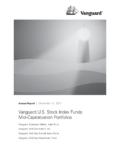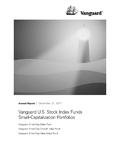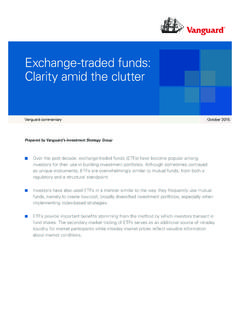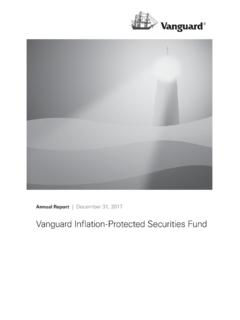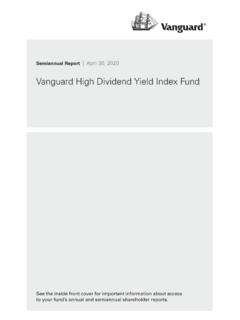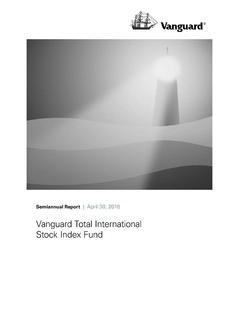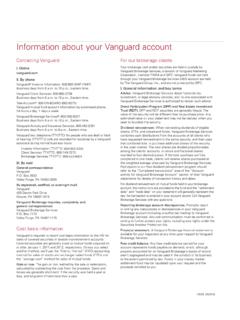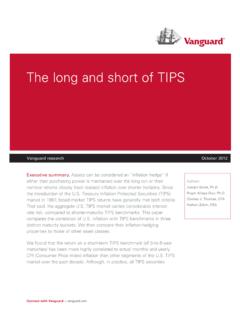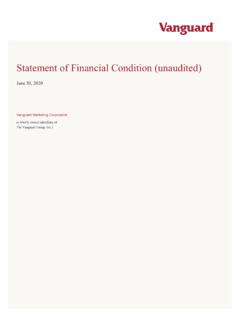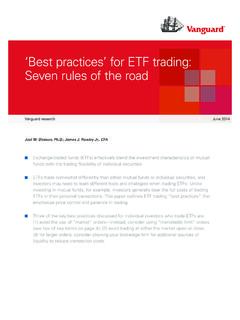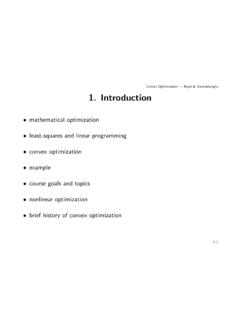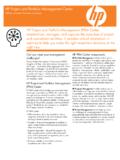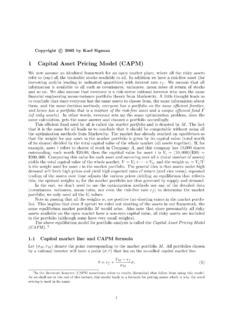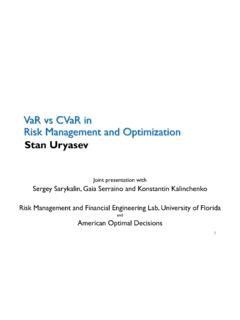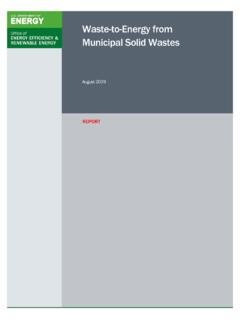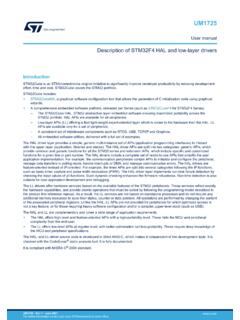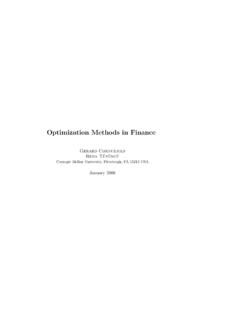Transcription of Assessing the value of advice - The Vanguard Group
1 Vanguard Research September 2019 Assessing the value of advice How should we measure the value of financial advisory services to investors? In this paper, we introduce a new three-part framework based on portfolio , financial, and emotional outcomes. We illustrate several aspects of our approach using data from Vanguard Personal Advisor Services (PAS), a hybrid service combining human and algorithmic elements to deliver financial advice . portfolio outcomes: We measured the value of advice on portfolio outcome by studying the changes in portfolio diversification of a sample of Vanguard self-directed investors who switched to an advisor. We found that advice led to meaningful changes for most. It materially altered equity risk-taking for two-thirds of the sample, reduced cash holdings for nearly three in ten investors, and eliminated home bias for over 90%.
2 Financial outcomes: To determine the value of advice on an investor s ability to achieve a financial goal, we calculated the forecast success rates of a sample of PAS clients who have established a retirement goal. Eight in ten have an 80% or greater probability of achieving a secure retirement, while two in ten are at risk. Emotional outcomes: To explain the importance of financial advice on an investor s sense of well-being, we developed an estimate for the fraction of value arising from emotional elements such as trust in or a personal connection with an advisor. Based on a survey of more than 500 PAS investors, emotional outcomes account for 45% of total perceived value . Another 55% of value is associated with functional aspects of the relationship, such as portfolio management, financial planning, and other services.
3 The advisory industry is increasingly interested in clarifying what constitutes value for investors and how to assess value for money paid. Our framework demonstrates the importance of defining value in the broadest sense, going beyond portfolio outcomes to include both financial outcomes and emotional well-being. In time, the industry will need to develop widely acceptable and comparable measures that encompass all three of these A. Pagliaro and Stephen P. Utkus21 See Bennyhoff and Kinniry (2018) and Blanchett and Kaplan (2018).2 See Betterment (2019).3 As examples, see Foerster, Linnainmaa, Melzer, and Previtero (2014), Brancati, Franklin, and Beach (2017), and Kim, Mauer, and Mitchell (2016).IntroductionGlobal demand for high-quality, cost-effective financial advice is growing.
4 In many countries, increasing reliance on defined contribution systems means more households will be retiring with substantial savings and will need affordable and effective help in managing them. More broadly, the financial services industry faces rising demand to improve client outcomes and value for money. New robo- and hybrid advisor services have emerged to address these concerns, using technology to expand their reach and improve their effectiveness. A large number of industry and academic studies have sought to develop better ways to measure the value of advice to investors. Many, such as Vanguard s Advisor s Alpha and the Morningstar gamma methodology,1 take a normative or simulation-based modeling approach.
5 Several robo-advisors have attempted to model the potential benefits of their methods using hypothetical or stylized Academic and policy researchers have contributed competing narratives as to whether or not professional advice contributes to investor Our paper adds to this debate by introducing a three-part value framework for advice , illustrated with data-driven metrics based on administrative and survey data from Vanguard s Personal Advisor Services (PAS). PAS is a hybrid advisory service combining algorithmic and human elements introduced in the in 2014. Our intention is not to provide a comprehensive exposition of the framework but rather to highlight the breadth of what constitutes value in an advisory relationship.
6 We believe the advisory community needs to build a broad set of measures beyond portfolio outcomes to quantify and report on value to investors. Only when value is clearly defined can debates over value for money be considered. The value frameworkOur framework defines three dimensions of potential value for advised investors (see Figure 1).Figure 1. value of advice framework ComponentDescriptionPortfolio valueOptimal portfolio construction and client risk-taking portfolio risk/return characteristics Tax efficiency Fees Rebalancing and trading activityFinancial valueAttainment of financial goals Saving and spending behavior Debt levels Retirement planning: cash flow, income, and health costs Insurance and risk management Legacy/bequest/estate planningEmotional valueFinancial peace of mind Trust in advisor and markets Success and sense of accomplishment Behavioral coaching ConfidenceSource: Vanguard , portfolio value .
7 The first dimension concerns the portfolio designed for the investor. value comes from building a well-diversified portfolio that generates better after-tax risk-adjusted returns net of all fees, suitably matched to the client s risk tolerance. portfolio value can be quantified in many ways, including different measures of portfolio risk-adjusted return, diversification and allocation metrics (such as active/passive share), the impact of taxes, and portfolio fees. Financial value . The second dimension assesses an investor s ability to achieve a desired goal. A portfolio does not stand on its own. It is in service to one or more financial goals, such as retirement, growth of wealth, bequests, education funding, and liquidity reserves.
8 One way to evaluate success is to estimate the probability of achieving a financial goal or wealth target at the end of a specified period. Ultimately, an advisor should seek to improve an investor s chance of achieving his or her desired future spending goal. To do this, the advisor must consider a myriad of planning-related metrics that extend beyond portfolio outcomes. These include financial behaviors such as optimal savings and spending; the assumption of debt; budgeting; insurance and risk management; various elements of tax-efficient retirement planning; and legacy, bequest, and estate planning. Emotional value . The third dimension is an emotional one: financial well-being or peace of mind.
9 The value of advice cannot be assessed by purely quantitative measures. It also has a subjective or qualitative aspect based on the client s emotional relationship with the advisor (or, in the case of robo-advisers, with the institution and its brand). Underlying elements include trust (in the institution or advisor), the investor s own sense of confidence, the investor s perception of success or accomplishment in financial affairs, and the nature of behavioral coaching such as hand-holding in periods of market studies of the value of advice have tended to focus on individual elements of this framework. Some have assessed portfolio outcomes, such as risk-adjusted returns and the value of portfolio tax efficiency, while others have estimated the impact of financial planning strategies on forecast wealth.
10 We believe that the value of advice arises along all three dimensions and that the relative importance of each will vary by investor and delivery method. Next, we illustrate the dimensions of our framework by presenting one outcome from each. We provide them not as a comprehensive analysis but to highlight the breadth of the concept of value in advice . Vanguard Personal Advisor ServicesThe studies in this paper are based on data associated with investors using Vanguard s hybrid advisory service, PAS. PAS is goals-based, providing ongoing management of assets and personalized investment portfolio recommendations centered on low-cost index and active mutual funds and ETFs. It charges an advisory fee of of assets or To begin, the service profiles investors based on their financial objectives, risk tolerance, investment horizon, and demographic and wealth characteristics.
